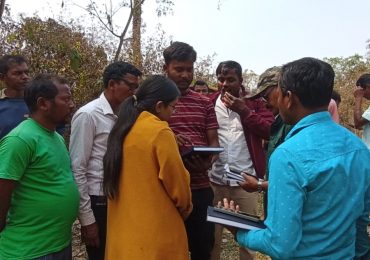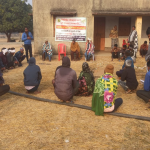The MV field team organized multiple community meetings in various locations of Jamui, Koderma and Giridih districts to make people aware about the effect of climate change on human lives, alternative strategies to deal with the change and how to raise community demand for various infrastructure and services which can help communities to mitigate climate change effects.
After multiple mobilizations by Gram Vaani’s field team, community members from some of the areas started raising demands through Panchayats for different services and structures.
In Purvi Guguldih Panchayat, Gidhaur block, Jamui district of Bihar, Gram Sabha submitted a plantation project plan where 9 marginalized farmers collectively came forward for the plantation project and demanded for saplings and other support like experts’ advice on land preparation, boundary net and water resource for the adequate watering of the saplings. After the community mobilization activities in the Dodhakola Panchayat, Koderma district of Jharkhand, Gram Sabha passed the proposed plan of 4 community soak-pits for ground water recharge.
Another such meeting took place in Begayin village, Advara block, Gridih District. Over 25 members actively participated in a discussion. These community members had previously informed their panchayat representative about issues such as land levelling, canal boundary repairing, and the need for pond construction to preserve rainwater. However, their demands were consistently ignored. The Mobile Vaani volunteers advised them to document the key discussions of the meeting and submit them along with all the demands and information about available land, to the mukhiya (Elected Representative) of the Panchayat.
Following a diligent follow-up process by MV volunteers for the inclusion of these demands in the NREGA work demand, they were incorporated, leading to the successful construction of ponds on the lands of Heeralal Tudu and Prakash Tudu. Thirteen NREGA workers were employed for over two months, and they received their wages directly in their bank accounts. Similarly, a pond of the same size was constructed on Prakash Tudu’s land, with twelve workers completing the task in two months and six days. They, too, received their wages in their respective bank accounts.
These ponds will provide significant benefits to over 50 individual families by serving as a reliable source of water. Moreover, they will contribute to enhancing water recharge within the village, resulting in improved plantation, agricultural crop production, and overall livelihoods of the farmers.








